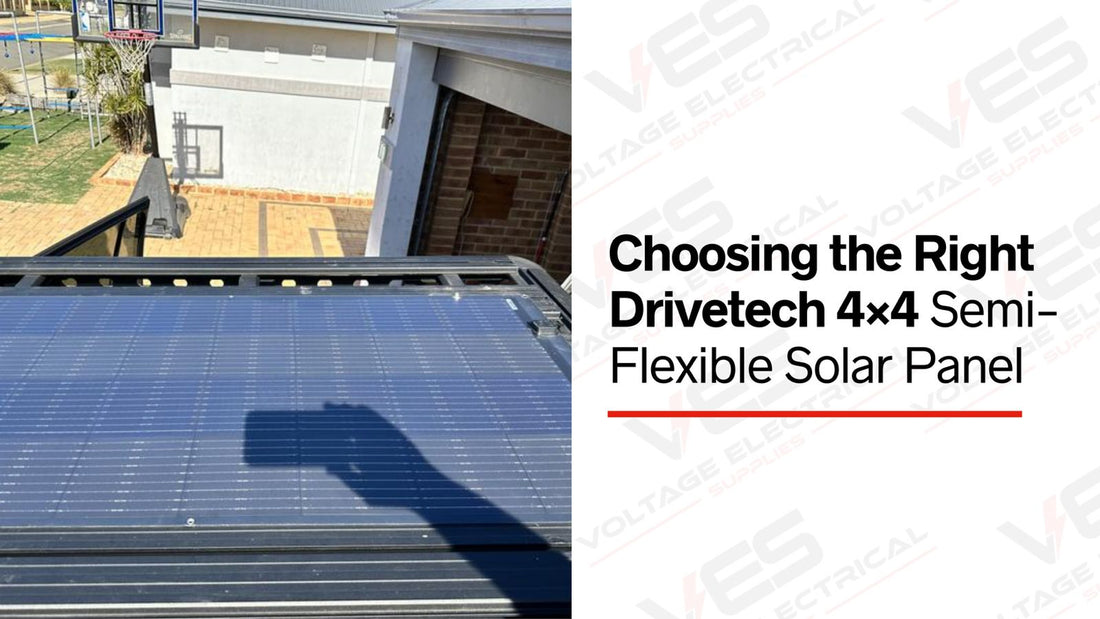
Choosing the Right Drivetech 4×4 Semi-Flexible Solar Panel
Share
In an era where off-grid power solutions are no longer a luxury but a necessity for outdoor enthusiasts, tools like high-performance solar panels have become indispensable. Among the brands catering specifically to 4WD, caravan, and overlanding setups, Drivetech has carved a niche with its semi-flexible solar panels.
In this article, we’ll explore what makes Drivetech panels stand out, compare their key models, and offer tips on choosing the right unit for your needs.

Why Choose Drivetech for Your Mobile Solar Setup?
When venturing off the grid, you want a solar solution that is:
-
Lightweight and durable
-
Capable of conforming to curved surfaces
-
Built for harsh outdoor conditions
-
Reliable in various climates and use cases
Drivetech addresses these needs via semi-flexible monocrystalline panels coated in ETFE and anti-crack film, reinforced with stainless steel eyelets and robust wiring. The ETFE topcoat enhances UV, chemical, and moisture resistance—making the panels more resilient in tough environments compared to ordinary PET- or laminate-based panels.
Furthermore, Drivetech’s product range spans multiple wattages (80 W, 110 W, 160 W, and 200 W) to suit varying needs and roof space constraints. This breadth gives users flexibility: smaller panels for trickle charging auxiliary batteries, or larger ones for heavier loads like fridges, lighting, or inverters.

Comparing Drivetech’s Top Semi-Flexible Models
Below is a comparison of four key models. Use this as a reference when deciding what fits your system best.
| Model | Power Output | Dimensions / Weight* | Key Electrical Specs | Suitable Use Cases |
|---|---|---|---|---|
| Drivetech DT-SPF80-1 | 80 W | 845 × 690 × 3 mm, ~1.8 kg | V_mp ≈ 18.5 V, I_mp ≈ 4.38 A, Voc ≈ 21.5 V | Small battery maintenance, auxiliary loads |
| Drivetech DT-SPF110-1 | 110 W | 930 × 670 × 3 mm | V_mp ≈ 20.16 V, I_mp ≈ 5.45 A, Voc ≈ 23.75 V | Moderate loads, fridges in daylight |
| Drivetech DT-SPF160 | 160 W | 1370 × 670 × 3 mm, ~3.9 kg | V_mp ≈ 18.5 V, I_mp ≈ 8.75 A, Voc ≈ 21.9 V | Bulk charging, powering appliances |
| Drivetech DT-SPF200-1 | 200 W | 1520 × 680 × 3 mm | V_mp ≈ 18.5 V, I_mp ≈ 10.8 A, Voc ≈ 22.68 V | High-demand systems, vehicle roof installs |
*Dimensions and weight are based on manufacturer specifications; actual usable area may vary with mounting.
Some observations:
-
All models share the same panel thickness (3 mm), enabling a sleek, low-profile installation.
-
The Voc (open-circuit voltage) is safely above 20 V in all models, making them compatible with standard 12 V battery systems with proper charge control.
-
As wattage increases, current (I_mp) becomes a more significant design factor for wiring and charge controller capacity.
Best Practices for Installing Drivetech Panels
To extract the most performance and longevity from your Drivetech panels, follow these installation tips:
-
Match voltage and current tolerances
Use a charge controller (PWM or MPPT) rated higher than your panel’s maximum current and voltage. This prevents overloading and ensures safe operation. -
Maintain good airflow
Even though semi-flexible panels can be bonded to surfaces, a slight gap under the panel helps dissipate heat, maintaining efficiency. -
Use torque-limited fasteners
Over-tightening eyelets or bolts can stress panel layers. Use torque specs as recommended by the installer or manufacturer. -
Clean gently and regularly
Use soft water and a microfiber cloth. Avoid abrasive brushes that may scratch the ETFE coating. -
Consider shade and orientation
Like any solar panel, partial shading reduces output. Try to orient panels toward the sun and avoid shading from roof racks or vents.
Key Takeaway
Drivetech’s semi-flexible solar panels combine durability, versatility, and practical design for mobile power systems. Whether you're outfitting a 4WD vehicle, camper trailer, or marine vessel, the range from 80 W to 200 W gives you flexibility to match your energy demands and roof space. With proper installation and system matching, they can provide dependable, off-grid solar energy for years.
